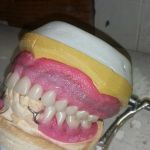Maintaining Healthy Teeth with Diabetes and Gastroparesis: A Preventive Care Guide
- Understanding the Challenges of Dental Health with Diabetes and Gastroparesis
- Why Oral Care is Essential for People with Diabetes and Gastroparesis
- Preventive Tips for Dental Health for Diabetes and Gastroparesis
- The Role of Diet in Oral Health for People with Diabetes
- Common Dental Problems in Diabetes and Gastroparesis
- Real-Life Stories of Managing Dental Health







 Wilshire Periodontics & Dental5.0 (2 review)
Wilshire Periodontics & Dental5.0 (2 review) Classic Dental Laboratory0.0 (0 review)
Classic Dental Laboratory0.0 (0 review) Lakeview Dental PC4.0 (29 review)
Lakeview Dental PC4.0 (29 review) Grafton Dental Care4.0 (152 review)
Grafton Dental Care4.0 (152 review) Dental Health Associates - Sun Prairie Clinic4.0 (622 review)
Dental Health Associates - Sun Prairie Clinic4.0 (622 review) Honey Creek Dental4.0 (58 review)
Honey Creek Dental4.0 (58 review) The Importance of Oral Health Education During Pregnancy for a Healthy Pregnancy
The Importance of Oral Health Education During Pregnancy for a Healthy Pregnancy Best Tips for Brushing Your Teeth Properly for Healthy Gums: Essential Techniques for Oral Health
Best Tips for Brushing Your Teeth Properly for Healthy Gums: Essential Techniques for Oral Health Why Skipping Dental Checkups Can Lead to Bigger Oral Health Problems
Why Skipping Dental Checkups Can Lead to Bigger Oral Health Problems Advantages of Porcelain Dental Restorations
Advantages of Porcelain Dental Restorations How Can Diabetes Cause Tooth and Gum Problems? Preventing and Managing Oral Health Issues
How Can Diabetes Cause Tooth and Gum Problems? Preventing and Managing Oral Health Issues Healthy Habits for Promoting Good Oral Health and Hygiene: Tips for a Healthy Smile
Healthy Habits for Promoting Good Oral Health and Hygiene: Tips for a Healthy Smile